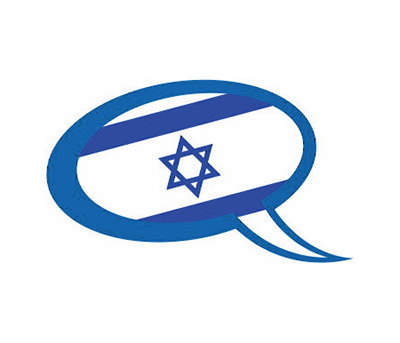
Traveling to Israel in the hope of visiting a vibrant, spiritual, modern country has been mostly a 2000-year-old dream for my ancestors. Every time I visit, I ask myself whether I fully appreciate the opportunity to hop on a plane and be in Israel 12 hours later. I challenge myself as to whether I am fully experiencing the wonder of Israel. And I think about whether the next generation of young, observant Jews has the ability to fully benefit from all that a trip to Israel can offer.
My latest visit to Israel was this past winter break. As usual, the trip was inspiring and invigorating.
I heard a lecture from Sivan Lahav Meir, a leading Israeli journalist who has started disseminating and teaching Torah to the masses. Her weekly Torah classes can get crowds of up to 1000 people, and she has 130,000 followers on Facebook, where she posts Torah thoughts on a regular basis. How exciting to hear major personalities in Israel dedicate their lives to teaching Torah!
I visited the Israel Museum, where I heard Dr. Adolfo Roitman, curator of the Shrine of the Book and one of the world experts on the Dead Sea Scrolls, and Dr. Avigdor Shinan, professor emeritus at Hebrew University, lecture about the Haftorah of the week. The diverse audience included religious and secular Israelis of all ages. How exciting to visit the local museum and hear a discussion about the week’s Haftorah! Only in Israel.
I listened intently to Israeli radio, switching between the left-wing secular and right-wing religious channels on a regular basis. Both channels interviewed Knesset members and communal leaders on a variety of fascinating, contemporary topics that gave me an understanding of the challenges that face a Jewish state in modern days. Passionate debates on whether to deport illegal foreign workers who hail from African countries, how to best implement laws that establish Shabbat as a national day of rest and how to respond to Polish attempts to rewrite history about Polish anti-Semitism during the Holocaust, gave me fresh insight into important moral and religious issues that Israelis grapple with on a daily basis.
I listened to the chief rabbi of Jerusalem speak on Shabbat morning as he welcomed a young new rabbi to the Chovevei Shul in Rechavia (the Shul that the Prime Minister often attends on the Yamim Noraim) and thanked the retiring rabbi for his 40 years of service.
I heard the new rabbi give a fabulous shiur on the Parsha that afternoon between Mincha and Maariv.
Sounds great, right? Well, here’s the rub: All the exciting aspects of my trip that I just described are just about inaccessible to most of our young people for one simple reason. Every experience listed above was in Hebrew and our children’s grasp of Hebrew is inadequate.
Young students who visit Israel can access spirituality through meaningful learning and visits to holy places. They can feel the inherent spirituality of the land of Israel. They can enjoy Israeli culture and music, and eat lots of great kosher food. Yet, so many of the intellectual and spiritual doors that are most exciting about contemporary Israel remain closed to them if they don’t engage in Hebrew.
I believe that strong Hebrew knowledge is a critical aspect of a robust and vibrant Jewish identity, as my trip to Israel illustrates.
I asked an administrator from one of the most well-respected women’s seminaries if his school offered any classes in Hebrew. He responded that they used teach in Hebrew, but over time they found that Hebrew classes were too difficult for the girls. “When we complained about the level of Hebrew knowledge to the high schools they blamed the elementary schools. The elementary schools then blamed the seminaries in Israel for not teaching Hebrew so that there is no supply of potential teachers in America who speak Hebrew.”
By working to promote Hebrew language at every level of Jewish education we can expand the opportunities for our children.
I articulated the value and importance of fluency in Hebrew language when I first came to Moriah. Many elementary schools share concerns that too overt a focus on Hebrew language will lead to a weakening of other important skills and affinities in limudei kodesh that we strive to teach our students. While this concern is a real concern and I have witnessed Hebrew-language environments where this occurs, I don’t think it is sufficient reason to hold back on teaching Hebrew. We can achieve all of our stated goals. Our experience at Moriah has shown us that this is possible. To cite one example, this year I am teaching an eighth-grade Navi class at Moriah. I have spoken exclusively in Hebrew the entire year. (The students did catch me saying an English phrase one time so far.) The students are successful and have shown that they are capable of interacting in a Hebrew-language environment. We can raise the bar by promoting more Hebrew language in early childhood, elementary, middle and high school, and in Israel. Our students’ ability to study Torah will be enhanced, their connection to Tefilla will be more meaningful, their understanding of the intellectual richness and vibrancy of Israel will be deepened and their Jewish and Israel identity will be strengthened.
I was approached by a recent oleh from West Orange after listening to a Hebrew shiur on my last day in Israel. He said that one of my goals as an educator should be for my students to understand shiurim like the one that we had just heard.
I wholeheartedly agree.
By Rabbi Daniel Alter
Rabbi Daniel Alter is the head of school at The Moriah School.











